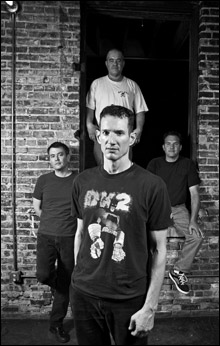
FEARLESSLY FAR OUT Like a Windy City Replacements, Naked Raygun tested what they could and made almost all of it work. |
Of Naked Raygun's many conquests, perhaps their greatest was impressing Steve Albini. In a 1992 Maximumrocknroll interview, Albini — the sharp-tongued musician/producer who, among other things, once dismissed Nirvana as "R.E.M. with a fuzzbox" and the Pixies as "blandly entertaining college rock" — offered a rare public endorsement. After seeing Raygun live, he enthused, "Oh my God, this is the greatest band in the whole world!"How did the group — who come to the Middle East this Wednesday — earn such a testimonial from the influential curmudgeon? The answer is pointedly uncomplicated. "I tried to never write any crappy songs," says vocalist Jeff Pezzati. "I know that sounds dumb, but we self-examined and were really picky about what ended up on vinyl, so we didn't have to relive a crappy song over and over."
After forming in 1981, NR spent a couple of years establishing an identity. "Before [1983 debut EP] Basement Screams came out, we didn't know what we were doing," recalls Pezzati. "We sounded like surf, like rockabilly, like us playing really terrible music from all different genres. Santiago [Durango, guitarist] came up with a lot of songs that had whoa-whoas in them. He quit the band kind of early, and we kept writing songs with whoa-whoas in them because they were catchy and easy to do."

Even with a revolving-door line-up, Raygun compiled a fearlessly far-out oeuvre. Pezzati's steely voice led a punk/post-hardcore mesh that jumped between tones and subjects. "Potential Rapist," from Basement Screams, sympathized with the misaligned title character, a man with "no sex interest." The broken fragments of "Peacemaker," from All Rise (1986), began, "I am the peacemaker/I'll pound sand right up your ass." "Soldiers Requiem," from Jettison (1988), was a paean to impossibly brave warriors; a year later, on Understand?, "Treason" confronted conspiracy. Like a Windy City Replacements, Naked Raygun tested what they could and made almost all of it work.
Pezzati doesn't buy that. "I don't know if there a real great progression in the albums like you say," he counters. "To me, it sounds like more of the same."
He also applies Raygun's no-bullshit approach to their own work. "We're our own worst critics. We'll call it like it is. If someone writes a song that sucks, we'll let them work on it and work on it and then finish it and tell him it really sucks." Off the top of his head, he identifies "Hot Atomics," a track from Last of the Demohicans (1997), as a song that was almost axed for good. "We wanted to be a band that never got to the point where we were doing it just to do it and we sucked at it. Once we did, we'd stop until we came up with new ideas again."
That built-in barometer of self-criticism is both what tore the group apart in the late '90s and what reunited them in 2006. Twelve years after Last of the Demohicans, they're assembling a new LP with material that Pezzati calls the Raygun album "you forgot to pick up."